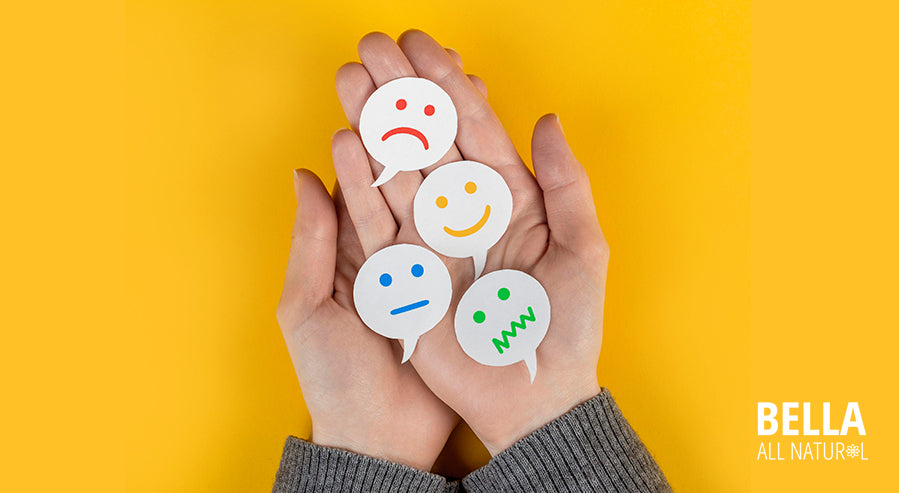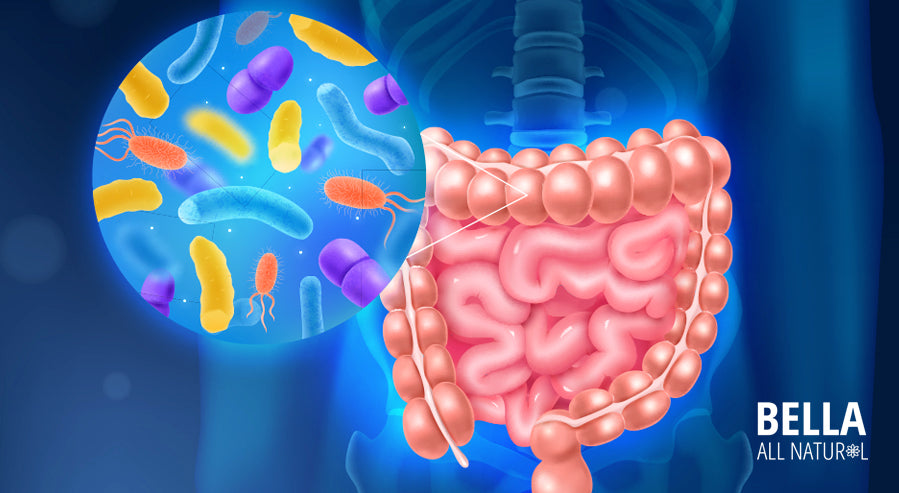

Have you ever felt like you have butterflies in your stomach when you're stressed or had a deep-down sense of why something was right or wrong? Your thoughts and your belly have a strong link. Actually, how your belly impacts your mood can be more important than you may believe.
Next, we're going to explore this interesting subject. We will look at everything from how feelings create physical reactions in our bellies to how changes in what we eat can alter our mood. We'll also look into new findings about good bacteria in our stomach as a possible way to help with worry and gloominess.
Scientists always uncover new facts about this complex bond we have with our second brain - yep, that's what it's called! You might think this is like a fairytale, but stay tuned!
The Gut-Brain Axis: Unraveling the Connection
Our stomachs do more than just break down food. They're also big players in our feelings, thanks to something called the stomach-brain connection.
This system ties together worry and stomach issues, making a busy street where your brain and stomach communicate. The truth is, this link is so solid that being upset can show in belly problems like heartburn or a tummy ache.
Your stomach isn't alone - it has help from billions of bacteria called microbiota. These small creatures play key roles in soaking up nutrients, helping the immune system, and even controlling mood.
An article from Harvard Health hints that these bacteria might talk with nerves through chemicals they make when they break down food. This article also details how changes in your stomach bacteria might have effects not just on your physical health but also on your mood and mind.
Simply put? A good stomach means a happy mind - and the other way around.

Normally, we think of bacteria as something bad or harmful, but it's important to keep in mind that there are both good and bad guys living inside us. Certain types - like the Lactobacillus ones - are seen as good for keeping balance in our stomachs while helping to manage stress by making something called gamma-aminobutyric acid (GABA).
Scientific studies point out that unevenness between bacterial types might lead to long-term conditions like irritable bowel syndrome (IBS), which results in distress and feelings of depression.
The food we eat can have a large impact on the make-up of our microbiome. For example, a meal plan rich in fiber can help our microbiota, which is good for both stomach health and feelings of well-being.
Stress that lasts for a long time can mess up this balance. How? Well, it does this by changing how quickly our bodies soak up nutrients or by causing problems with stomach function. That's why it's important to manage stress levels effectively.
And remember, a happy gut makes for a happy mind! So why not take that extra step towards better health, starting today? After all, our well-being is certainly worth it, wouldn't you agree?
Emotions and Gut Health
So, the tie between our feelings and how our stomach feels is closer than you might guess. Feelings like anger, happiness, or joy can indeed start problems in the stomach. Have you ever had a "stomach feeling" about something? That's your brain communicating with your tummy.
Studies have found that stress can even boost the pain you're already feeling in your stomach. This link is not just a one-way street; it goes both ways - from head to gut and back again.
You've probably noticed that when you're stressed or nervous, your stomach feels weird. That's because some feelings can touch your digestive system, leading to problems like heartburn or upset stomach issues (IBS).
Why? This happens as a part of our body's natural reaction to stress, which includes the release of hormones that touch digestion, among other things. Believe it or not, a lot of people with IBS see their troubles get worse during times of high stress.

On top of that, here's a cool fact - could it be that this talk also happens the other way? Yes. Just as feelings like worry or joy send signals from our heads to our stomachs, starting different responses there,
Strong feelings can lead to physical troubles in the stomach. Anger, for example, might cause a sick stomach, while sadness could slow digestion, leading to getting backed up.
It can bring a big change in your overall health. The link between your feelings and digestion is not just in your head; it's true. So, if you're feeling really happy or super sad, keep in mind that these strong feelings might mess up your stomach, too. Being aware of this link can help you handle any belly problems.
Functional Gastrointestinal Disorders & Mental Health
Have you ever felt a tight squeeze in your tummy when you're worried? Or found out that stress sets off your irritable bowel syndrome (IBS)? You're not the only one. A lot of people notice that both their feelings and physical state can change how their gut behaves.
Your belly and mind are closely linked. In a way, when one sneezes, the other catches a cold. That's true, especially when talking about problems like IBS. Symptoms can get worse due to strong feelings or worry.
Sometimes, this back and forth leads to a "tough cycle." It's a bit like having two good pals who look out for each other but also know how to get on each other's nerves. If you're stressed or worried, your belly gets upset, which makes your stress go up.
Recent tests have shown that people who feel lots of stress tend to have belly problems like heartburn or constipation. These issues are less common in those who lead quieter lives.
And this is not just about being comfortable. Some studies found links between untreated belly problems in the long run and issues with mental health, for example, depression and being constantly worried.

We've all heard that good bacteria help us break down our food, but did you know they might also sway our mood? Your belly bacteria are made up of trillions of different sorts. They handle important jobs, from soaking up nutrients to boosting immunity. But these tiny guys might be doing something more - controlling our feelings through the vagus nerve. Sounds wild, doesn't it?
There are more and more signs that the mix of bacteria in our belly might be sending signals to our minds, which could then affect our mental health. Tests on animals showed that changing the belly bacteria also changed their behaviors.
Don't worry; we're not saying your tummy is out to take over the world. But this new line of work opens the door to fresh ways of treating both belly and mind symptoms at the same time. Cool, huh?
Anyhow, let's dive deep and see what lies ahead. It's time to buckle up and find out what the future holds.
The Role of the Microbiome in Mental Health
New research shows that there could be a link between the bacteria in our gut and how we feel. It's a really interesting field of study, showing just how linked we are to the tiny creatures living inside us.
Your gut is full of loads of bacteria, often referred to as the microbiome. This busy world of bacteria helps with lots of body functions like digestion and keeping you healthy, and also has a part in how you feel mentally. Studies show that changes in this complicated system can alter your mood. The most common types of bacteria in adult guts are Bacteroidetes and Firmicutes.
Different types of bacteria affect different parts of health. For example, Lactobacillus types are often linked with improving your mood. Keeping a balance of good bacteria helps you get the best nutrition from your food while also keeping you safe from harmful bacteria.

People often feel stressed and down when they have health problems like IBS, which may start in the gut. This isn't only happening with IBS; long-term stress can seriously change the types and amounts of bacteria in our gut, which might make feelings of depression worse.
If bad bacteria outnumber the good kind in your gut - something we call dysbiosis - this can spark inflammation throughout your body. This might hinder how nerve cells work or how blood flows in important places like the brain, leading to serious issues with mental health over time if not managed.
Let me clarify: If you're feeling sad or stressed, it might be more than just your thoughts affecting you. It could be your gut telling you that something's wrong.
Although there's so much we still don't understand about this connection between the gut and the brain, it gives us new ways to think about treating mental health. One possible way to do it is by changing the types of bacteria in your gut through what you eat or via the use of probiotics to lower stress and raise mood.
It's the reason we often suggest including foods like yogurt, kombucha, and kimchi in your meals. These foods are full of good bacteria that boost your gut health. After all, a healthy gut is the key to overall well-being.
Probiotics as Potential Treatment for Mental Health Disorders
For those who often feel worried or sad, things like probiotics might help. Our bodies have lots of useful tiny creatures that help us every day; not all bugs harm us.
The gut, which is full of these creatures, links to mental problems like feeling worried or sad. It works kind of like your personal fan club – when it's good, you feel on top of the world. But if it's not? Well, you don't feel that good.
Let's discuss these little proteins known as cytokines. Think of them as body mailmen. But, if you release too many of them when you're stressed or sick, they can cause swelling. Adding probiotics to your diet may help control and balance these cytokines.
Swallowing some friendly bacteria (or probiotics) every day might keep your body's alarm system from going off. They do this by keeping a lid on too many cytokines and making your gut strong. It's like how bouncers at a club handle naughty guests.

Key studies showed that some types of probiotics could lessen symptoms tied to feeling worried or down. This works for both people and animals. If you think this is too nice to be true - no way! We're not joking. Have a look at this article from the National Institutes of Health.
It's important to have a chat with your doctor before you start taking probiotics. This is just like making plans for any other treatment. After all, what's fantastic for one person might not work that well for another.
In conclusion, we're only starting to understand the link between our gut health and feeling good. But isn't it exciting? Just imagine, making your gut healthier could possibly make you happier overall!
Dietary Influence on Gut Health & Mental Well-being
The food you eat doesn't just change your size. It also touches on the health of your stomach and, in turn, your brain. , more and more studies are making clear the big part your food habits play in shaping the good and bad bugs in your gut. These can change your mood and how you act.
Eating a healthy mix of food, especially those high in stuff like fructo-oligosaccharides and galacto-oligosaccharides, goes a long way in feeding the helpful stomach bacteria. Good bacteria are crucial in reducing how much stress can affect other important bugs in your gut. This can help you feel better physically and mentally.

How come? Well, Breastfeeding babies early in their life provides nutrients that help build a healthy mix of gut bacteria. This helps babies have better overall health and a smaller chance of feeling down later in life.
See, studies in animals show that some types of bacteria are linked with how well nutrients - like the fatty acids that nerve cells need to work - are taken up in the gut. This connects gut health to brain function through a route known as the vagus nerve.
Foods like yogurt or kimchi that have live bacteria help maintain a diverse gut bacteria balance. Plus, they help ensure the stomach's defense against harmful things that could get into the blood.
Staying away from overly made-up food can lower your chance of stomach problems tied to irritable bowel syndrome (IBS). IBS can often bring about cycles of pain, constipation, and diarrhea that hit your life quality, including your sense of peace. In short, remember, it's not just about not eating the bad food, but also about adding the good food to your everyday meals.
Gut Dysbiosis, Inflammation & Mental Illness
Think of your stomach as a busy city where good bacteria act as the police. Sometimes, there's a mix-up in this bacteria city—also called dysbiosis —and it's like having bad people move in. This mix-up can start problems like swelling and can lead to various mental health issues.
Dysbiosis can mess up not just our stomach health but also how our brain works. Our stomach is closely tied to the main nerve system, which scientists call the gut-brain connection. It's like a two-lane road where each lane affects the other; when one lane is in trouble, it sends signals that can change one's feelings and the other way around.

Anyway, your helpful stomach bacteria can support your mental health by making nerve messengers like GABA, which helps handle fear or worry.
In fact, some studies show that changes in the bacteria city might be linked to having sad feelings or even big depression. How this affects the body's defenses is another thing to consider: for example, some types of lactobacillus are known for fighting swelling, and that's why they help keep a tight stomach wall against stress.
Fair enough. This conversation between your actual brain and its little partner inside your stomach uses complex two-way communication, such as nerve cells - like the vagus nerve - sending messages all the time.
Harvard Health explains that your stomach has its own nerve system, and it's so complicated they often call it the body's "second brain." This complex network helps control blood flow and drips needed to take in nutrients.
Keep it All Natural
Sorting out how your gut affects your mood is like going on an adventure. We've observed that feelings, such as worry or joy, greatly affect our stomach health.
We've looked into gut issues related to stress. The complex back-and-forth between thoughts and physical feelings shows how much our brains and stomachs interact.
The influence of the gut's bacteria on our moods is really surprising. Variations can connect with a range of problems, from sadness to autism. But trust me, there's good news. Good bacteria added through things like yogurt show promise in treating these issues.

Changes in what you eat affect the types of bacteria in your gut. Basically, simple changes could steer us towards better mental health. Just remember: keeping a balanced diet is important.
When all is said and done, every message between your brain and gut matters! So pay attention because your stomach - your second brain - may be trying to tell you something crucial about your health!



